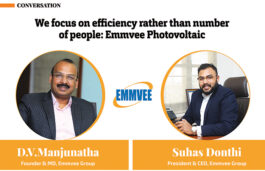Highlights :
- Dr Rajiv J. Shah, President of The Rockefeller Foundation, is in New Delhi, meeting Indian dignitaries and mobilising support for renewables to combat the climate crisis.
- Dr Shah delivered a special lecture on “Tackling the Climate Crisis by Dramatically Expanding Access to Renewable Technologies Across the Developing World” hosted by International Solar Alliance.
 Romania Joins As The 118th Member Country Of International Solar Alliance
Romania Joins As The 118th Member Country Of International Solar Alliance The International Solar Alliance (ISA) recently hosted a special lecture in New Delhi, which also saw the presence of officials from The Rockefeller Foundation. The theme of the lecture was ‘Tackling the Climate Crisis by Dramatically Expanding Access to Renewable Technologies Across the Developing World’.
The Rockefeller Foundation, a philanthropy body built on collaborative partnerships at the frontiers of science, technology, and innovation focussed on scaling renewable energy for all, and the ISA are working in unison to provide support to Least Developed Countries (LDCs) and Small Island Developing States (SIDS) with the implementation of innovative solar projects and by building resilience in key sectors such as agriculture and health. The projects supported through this partnership are expected to enable faster replication across other countries.
“By scaling technologies like solar mini-grids, Indian innovators have demonstrated that access to affordable, reliable power is possible at scale,” said Dr Rajiv J. Shah, President of The Rockefeller Foundation, while delivering his talk on the occasion. He said that “solar, wind, and other renewable technologies can empower people around the world – finally ending energy poverty – and India can help lead the way,” he said.
“For 110 years, The Rockefeller Foundation has made big bets to ensure everyone has access to the latest advances in science and technology,” said Dr Shah. “We’re currently making the biggest bet in our history, building the partnerships required to unlock the potential of renewable energy for those who right now do not have access to the electricity they need to compete In the modern economy.”
The Director General of the International Solar Alliance, Dr Ajay Mathur, underlined the inevitability of renewables in his opening address, saying, “The tipping point in the rise of solar as a global choice of clean energy has been reached. The rise in investment flows into the sector, the technological innovations, combined with the coupling ability of the technology, which spreads across applications, is paving the field for formidable ambitions and subsequent achievements. Political will defined through efficient policies is the way forward for solar-powered solutions. If successfully scaled, they can be the game-changer in the global energy transition by helping countries meet their climate goals.”
Accelerating Renewables Deployment: Challenges & Opportunities
The programme proceedings also included a panel discussion, themed, ‘Accelerating Renewables Deployment’ moderated by Mihir Sharma, Director, Centre for the Economy and Growth, Observer Research Foundation and featured Rupesh Agarwal, CEO, Azure Power; Simon Harford, CEO, Global Energy Alliance for People and Planet (GEAPP); Anita George, Co-Founder, Edhina Capital; and Prof. Navroz Dubash, Professor, Centre for Policy Research as panellists.
The panel emphasised that consuming electricity is pivotal for households and communities to lift themselves out of poverty. Without abundant access to electricity, underserved homes, businesses and communities have a minimal chance of achieving a high economic and social well-being in today’s increasing energy-enabled economies. It also highlighted that Investors and investments come in when things are commercially viable and sustainable, combined with an enabling environment.
Even though costs have come down over the years, the cut-throat competition on the ground continues, while concluding that the opportunity is enormous, but project development is time-taking. Increasing technology access, adoption, and blended finance are some of the answers to this predicament. Innovations in technology have ensured the megawatt to gigawatt transition, but other vital aspects of addressing institutional and policy issues need to be resolved. A wide array of solutions and partnerships need to be aligned for a people-centric transition, were some the takeaways from the session.
The International Solar Alliance is an international organisation with 114 member and signatory countries. It works with governments to improve energy access and security worldwide and promote solar power as a sustainable transition to a carbon-neutral future. ISA’s mission is to unlock US$ 1 trillion of investments in solar by 2030 while reducing the cost of the technology and its financing.
International Solar Alliance and United Nations Development Programme (UNDP) recently announced the launch of pilot projects on Scaling Solar Applications for Agriculture Use (SSAAU), in ten African ISA member countries



























